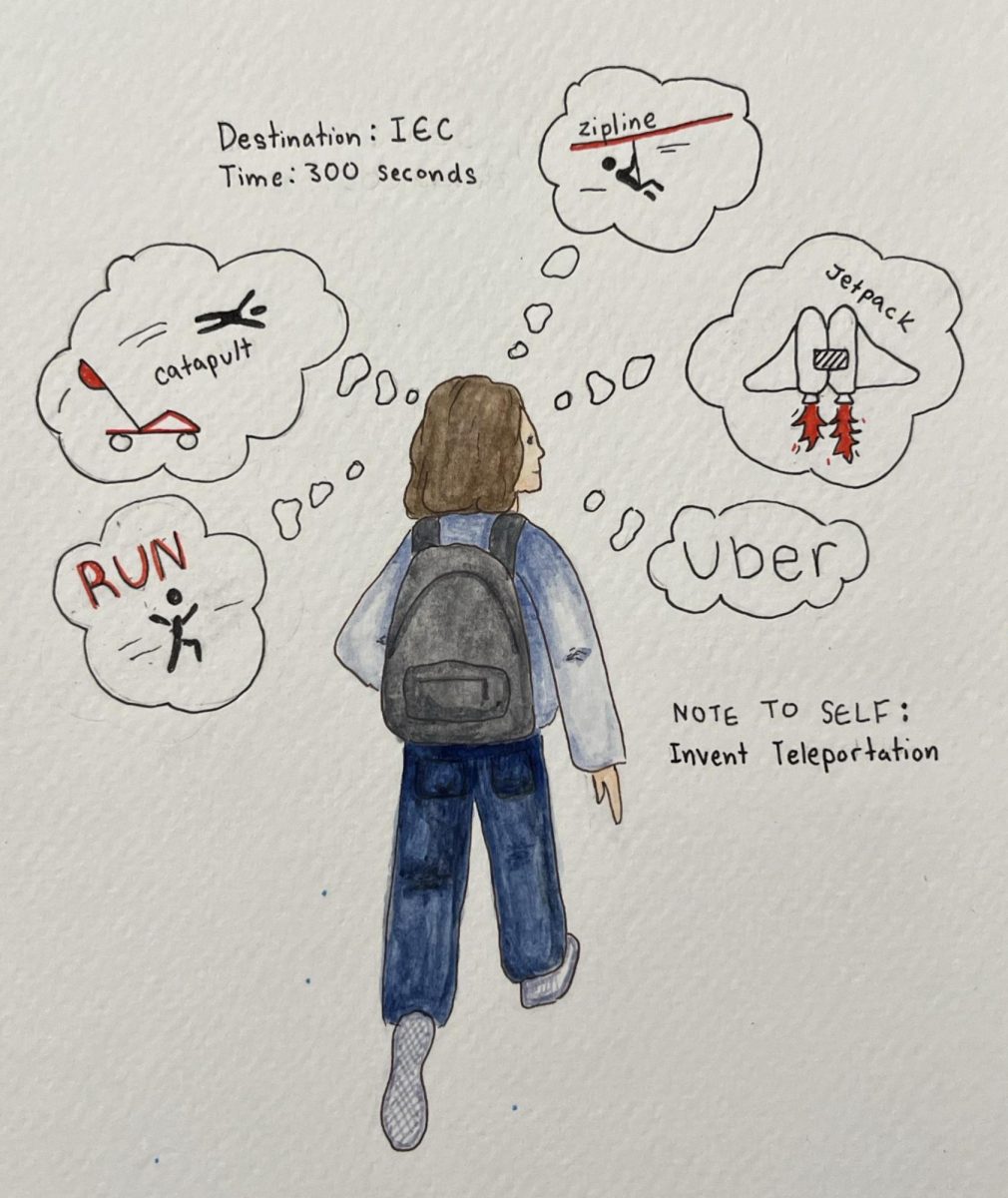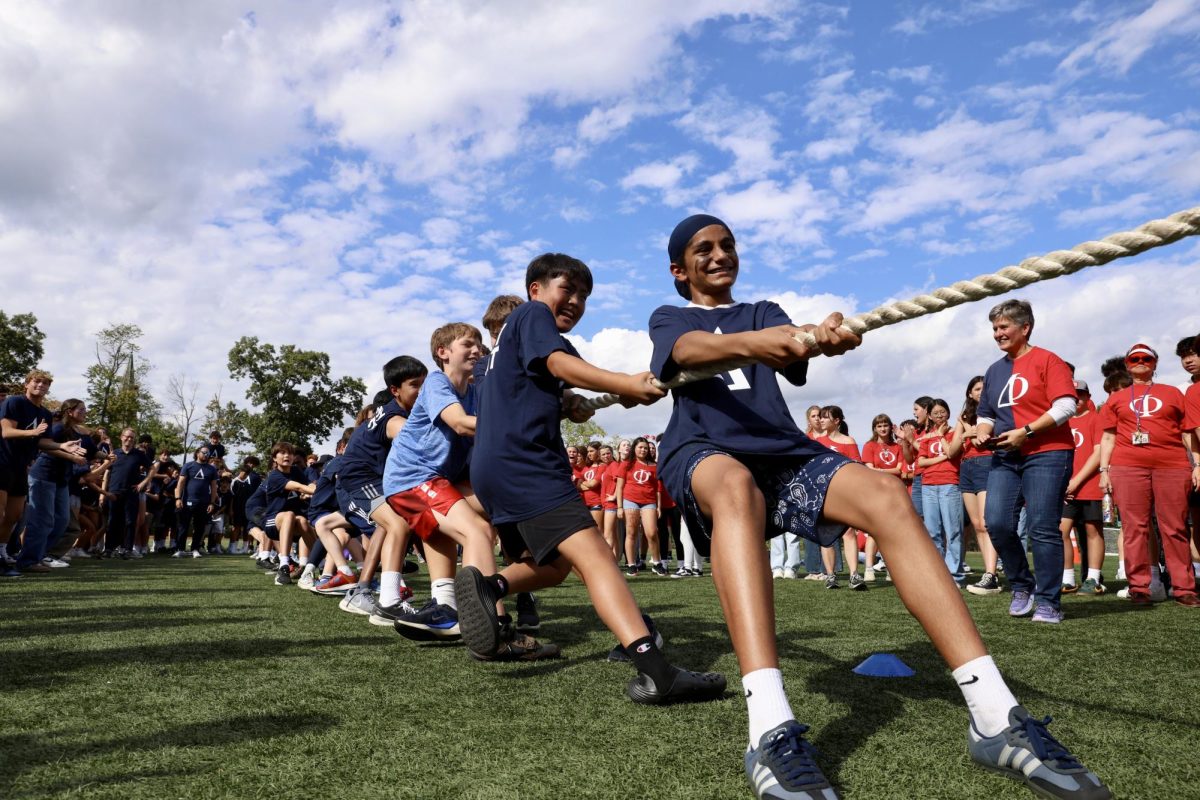Imagine this — you’re in a class on the third floor of Masters Hall. The Harkness discussion was productive; so productive that the class went a few minutes overtime. You pack up as quickly as you can and race down the stairs. Before you leave Masters Hall, though, you head to the bathroom, because you’ve been holding it in for the entire 75-minute period. Finally, you sprint across the road to the Innovation and Entrepreneurship Center (IEC), where your next class takes place. By the time you get there, sweaty and panting, you glance at the clock. You are late to class.
For some of us – myself included – we don’t need to imagine this scenario, because we’ve lived it. Sometimes, it can take longer than anticipated to get from point A to point B, and there are often factors outside our control. One of these factors is foot traffic; for example, it can take longer to leave the Claudia Boettcher Theatre (CBT) after Morning Meeting when the hallway is full of bodies heading in different directions, and the walls are lined with backpacks, making the walking space narrower. Another one is terrain, since it can take longer to go up and down hills and tire people out faster.
Distance, however, is one of the biggest factors in determining how long it will take to get from one part of campus to another. The newest building on Masters’ campus, the IEC, is a bit off the beaten path, and it takes a while to get there, even from Masters Hall. I imagine the journey would be even longer coming from a place like Cushing Dorm, where students have study halls. All of this raises the question: is five minutes enough passing time?
To me, the answer is no. As a student with three classes in the IEC, five minutes simply isn’t ample time to get there. When I have lunch before one of my IEC classes, I allow myself ten minutes to make the trek, so perhaps 10-minutes of passing time might be more reasonable.
In theory, it seems like a great idea. So why shouldn’t Masters implement it?
One of the obvious drawbacks is that a longer passing time would cut into class time, and we would have to make classes shorter. Sara Thorn, the associate head of Upper School, said she does not think we should shorten periods any more than we already have.
“We’re at 75 minutes, and the schedule was conceived at 80 minutes,” she said. “We’ve already shortened and added five minutes of passing time, so we’re not going to add more time.” She continued, “It’s absolutely possible to walk from the third floor of Masters Hall to the IEC in five minutes. It’s not that far. You just can’t linger with your friends in the halls.”
Thorn went on to say that she doesn’t feel longer passing time is necessary because most class periods aren’t touching each other. She said, “After first period, there’s Morning Meeting and Advisory, and in between second and third period, half the student body goes to class but the other half goes to lunch. It’s the same thing between third and fourth period.” She concluded, “I don’t think we need more than five minutes.”
Additionally, longer passing times would cut into club time from 3:05 to 3:45 as well as “Panther Time” (the block from 3:45 to 5 when sports and co-curriculars meet), and the sports teams need their time at the end of the day to practice.
Logan Condon, the director of the Athletics Department, said, “We have the five o’clock buses, so JV practices have to end early. Right now, they only get an hour and 15 minutes of practice time whereas most schools do two hours of practice time for JV programs, so it’s less time to actually be prepared for the sport that you’re doing.”
Condon also spoke about how the original addition of Panther Time benefited his department. He said, “[The addition of Panther Time] allowed for students to miss less class time for athletic dismissals. We have one of the latest school days when compared to our peer schools who we compete against, and we are always conscious to make sure that our students don’t miss a lot of class time.”
Jonah Breen ‘24 said he thinks that whether five minutes is sufficient passing time depends on the classes.
“There are some people who have classes up in the dorms and then have to run down to the IEC, and five minutes is not reasonable for that,” he said. “But running from the first floor of Morris to the second floor of Masters Hall? Yeah, sure, five minutes is enough.”
In conclusion, it’s not looking like longer passing time can be a viable option. For now, the best thing that I can suggest to those of you with long walks from building to building is to walk quickly, obtain late passes when necessary and communicate openly with your teachers when you think you might be late.






